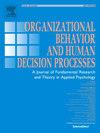偿还代际债务:移民子女如何以及为什么在工作中努力
IF 3.8
2区 管理学
Q2 MANAGEMENT
Organizational Behavior and Human Decision Processes
Pub Date : 2025-03-01
DOI:10.1016/j.obhdp.2025.104406
引用次数: 0
摘要
移民子女被称为第二代,是发达国家劳动力中增长最快的部分。然而,他们独特的工作经历、行为和结果在管理学术中仍然明显缺失。在本文中,我们探讨了为什么第二代员工,尽管他们的成长环境不利,始终优于本地出生的父母的孩子,被称为第三代。根据心理契约理论,我们认为这种矛盾的现象可以用移民交易来解释,移民交易是一种独特的心理契约,移民父母的牺牲期望被第二代孩子的成功所补偿和验证。这种讨价还价形成于生命早期,培养了一种负债感,激励第二代人努力争取更高的组织地位(即加薪、晋升)和更高的社会地位(即收入、职业地位),作为报答父母的手段。通过使用美国和欧洲样本的七项研究,我们提供了强有力的证据来支持我们的理论模型。这项工作推进了对组织中移民世代的研究,并增强了我们对工作之外的心理契约如何影响工作场所内部行为的理解。本文章由计算机程序翻译,如有差异,请以英文原文为准。
Paying off the intergenerational debt: How and why children of immigrants status-strive at work
Children of immigrants, referred to as second-gens, are the fastest growing segment of the labor force in developed countries. Yet, their unique workplace experiences, behaviors, and outcomes remain conspicuously absent in management scholarship. In this paper, we explore why second-gens employees, despite their disadvantaged upbringings, consistently outperform children of native-born parents, referred to as third-gens. Drawing on psychological contract theory, we argue that this paradoxical phenomenon is explained by the immigrant bargain—a unique psychological contract whereby the sacrifices of the immigrant parents are expected to be redeemed and validated by the success of the second-gen child. Formed early in life, this bargain fosters a sense of indebtedness, motivating second-gens to strive for higher organizational status (i.e., pay raise, promotion) and higher societal status (i.e., income, occupational status) as means of repaying their parents. Across seven studies using American and European samples, we provide robust evidence supporting our theoretical model. This work advances research on immigrant generations in organizations and enhances our understanding of how psychological contracts outside of work spillover to affect behaviors inside the workplace.
求助全文
通过发布文献求助,成功后即可免费获取论文全文。
去求助
来源期刊
CiteScore
8.90
自引率
4.30%
发文量
68
期刊介绍:
Organizational Behavior and Human Decision Processes publishes fundamental research in organizational behavior, organizational psychology, and human cognition, judgment, and decision-making. The journal features articles that present original empirical research, theory development, meta-analysis, and methodological advancements relevant to the substantive domains served by the journal. Topics covered by the journal include perception, cognition, judgment, attitudes, emotion, well-being, motivation, choice, and performance. We are interested in articles that investigate these topics as they pertain to individuals, dyads, groups, and other social collectives. For each topic, we place a premium on articles that make fundamental and substantial contributions to understanding psychological processes relevant to human attitudes, cognitions, and behavior in organizations. In order to be considered for publication in OBHDP a manuscript has to include the following: 1.Demonstrate an interesting behavioral/psychological phenomenon 2.Make a significant theoretical and empirical contribution to the existing literature 3.Identify and test the underlying psychological mechanism for the newly discovered behavioral/psychological phenomenon 4.Have practical implications in organizational context

 求助内容:
求助内容: 应助结果提醒方式:
应助结果提醒方式:


